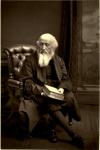Why, his heart's lik' a popple, so hard as a stwone,
Vor 'tis money, an' money's his ho,
An' to handle an' reckon it up vor his own,
Is the best o' the jaÿs he do know.
Why, vor money he'd gi'e up his lags an' be leäme,
Or would peärt wi' his zight an' be blind,
Or would lose vo'k's good will, vor to have a bad neäme,
Or his peace, an' have trouble o' mind.
But wi' ev'ry good thing that his meänness mid bring,
He'd paÿ vor his money,
An' only zell honey to buy zome'hat sweet.
He did whisper to me, "You do know that you stood
By the Squier, wi' the vote that you had,
You could ax en to help ye to zome'hat as good,
Or to vind a good pleäce vor your lad."
"Aye, aye, but if I wer beholdèn vor bread
To another," I zaid, "I should bind
All my body an' soul to the nod of his head,
An' gi'e up all my freedom o' mind."
An' then, if my païn wer a-zet wi' my gaïn,
I should paÿ vor my money,
An' only zell honey to buy zome'hat sweet.
Then, if my bit o' brook that do wind so vur round,
Wer but his, why, he'd straïghten his bed,
An' the wold stunpole woak that do stan' in my ground,
Shoudden long sheäde the grass wi' his head.
But if I do vind jaÿ where the leaves be a-shook
On the limbs, wi' their sheädes on the grass,
Or below, in the bow o' the withy-bound nook,
That the rock-washèn water do pass,
Then wi' they jaÿs a-vled an' zome goold in their stead,
I should pay vor my money,
An' only zell honey to buy zome'hat sweet.
No, be my lot good work, wi' the lungs well in plaÿ,
An' good rest when the body do tire,
Vor the mind a good conscience, wi' hope or wi' jaÿ,
Vor the body, good lewth, an' good vire,
There's noo good o' goold, but to buy what 'ull meäke
Vor our happiness here among men;
An' who would gi'e happiness up vor the seäke
O' zome money to buy it ageän?
Vor 'twould seem to the eyes ov a man that is wise,
Lik' money vor money,
Or zellèn woone's honey to buy zome'hat sweet.






